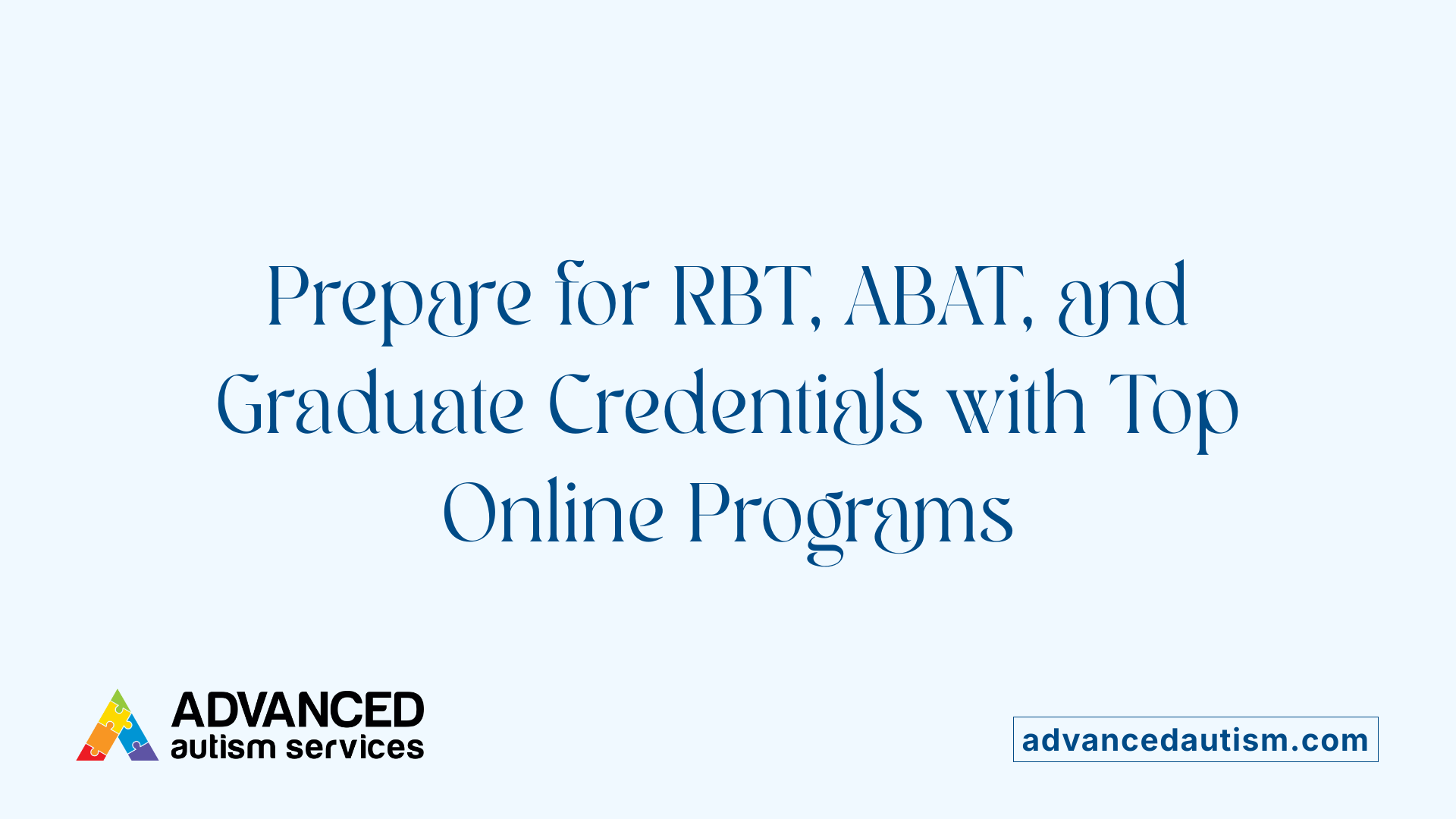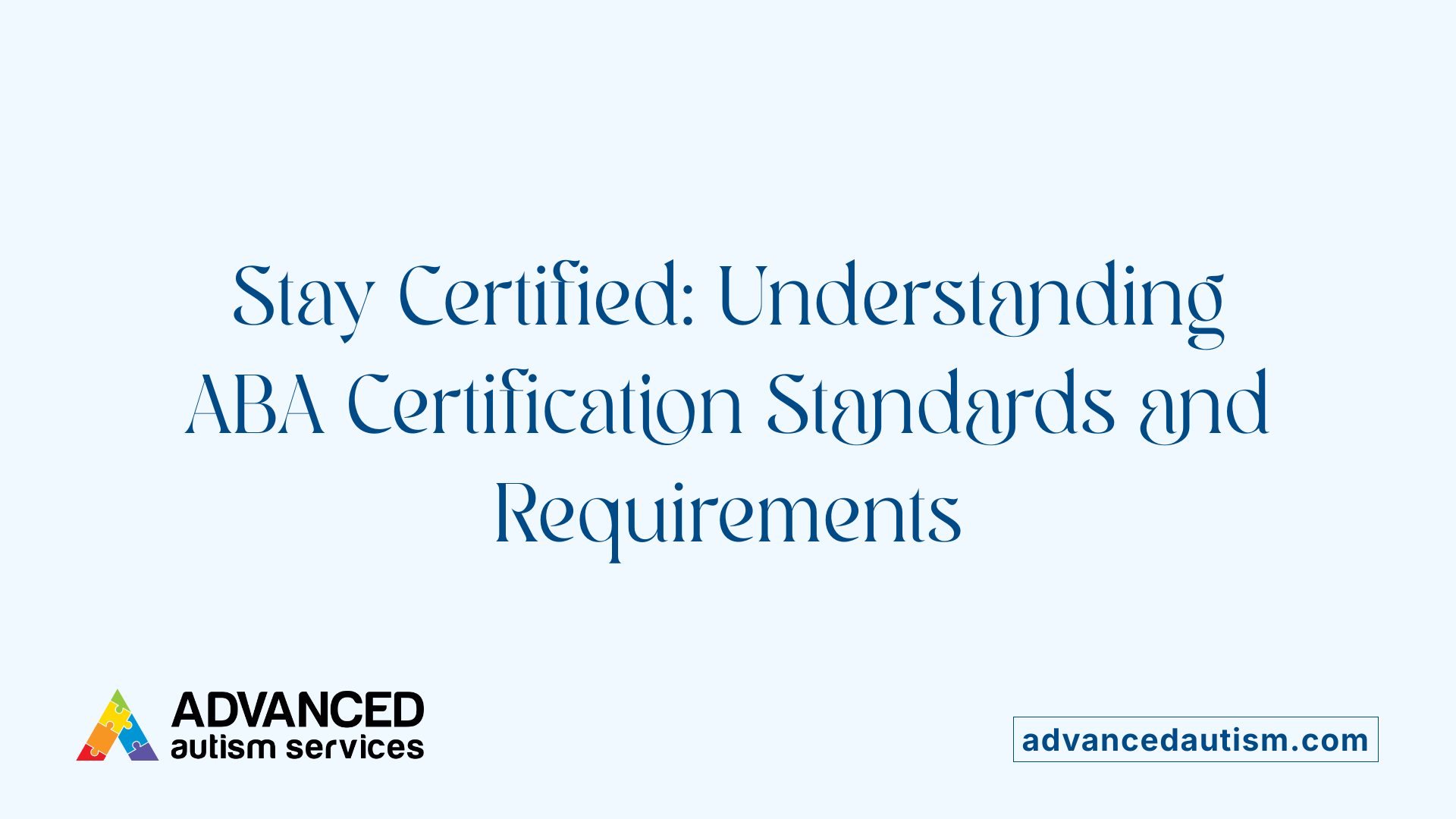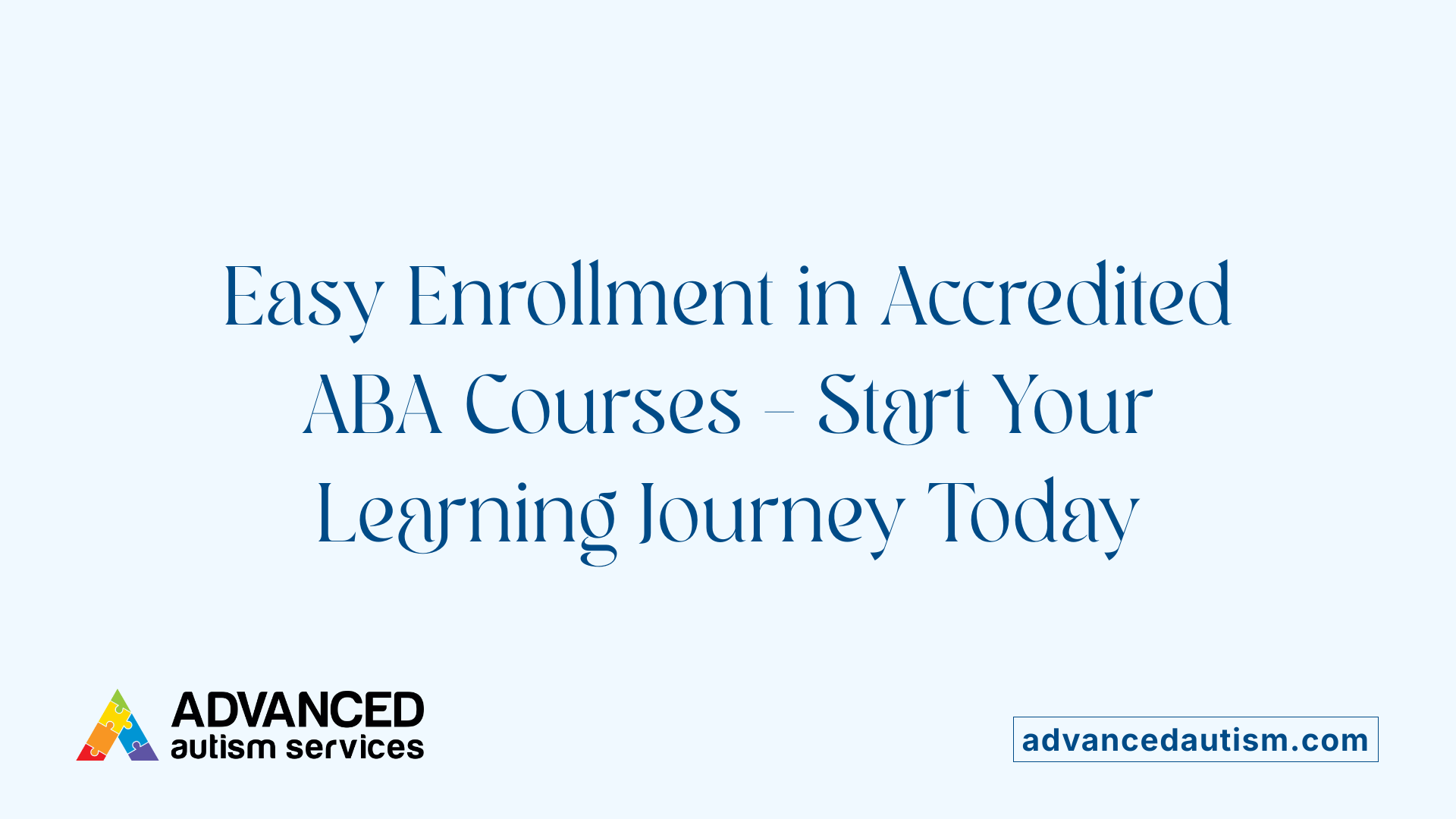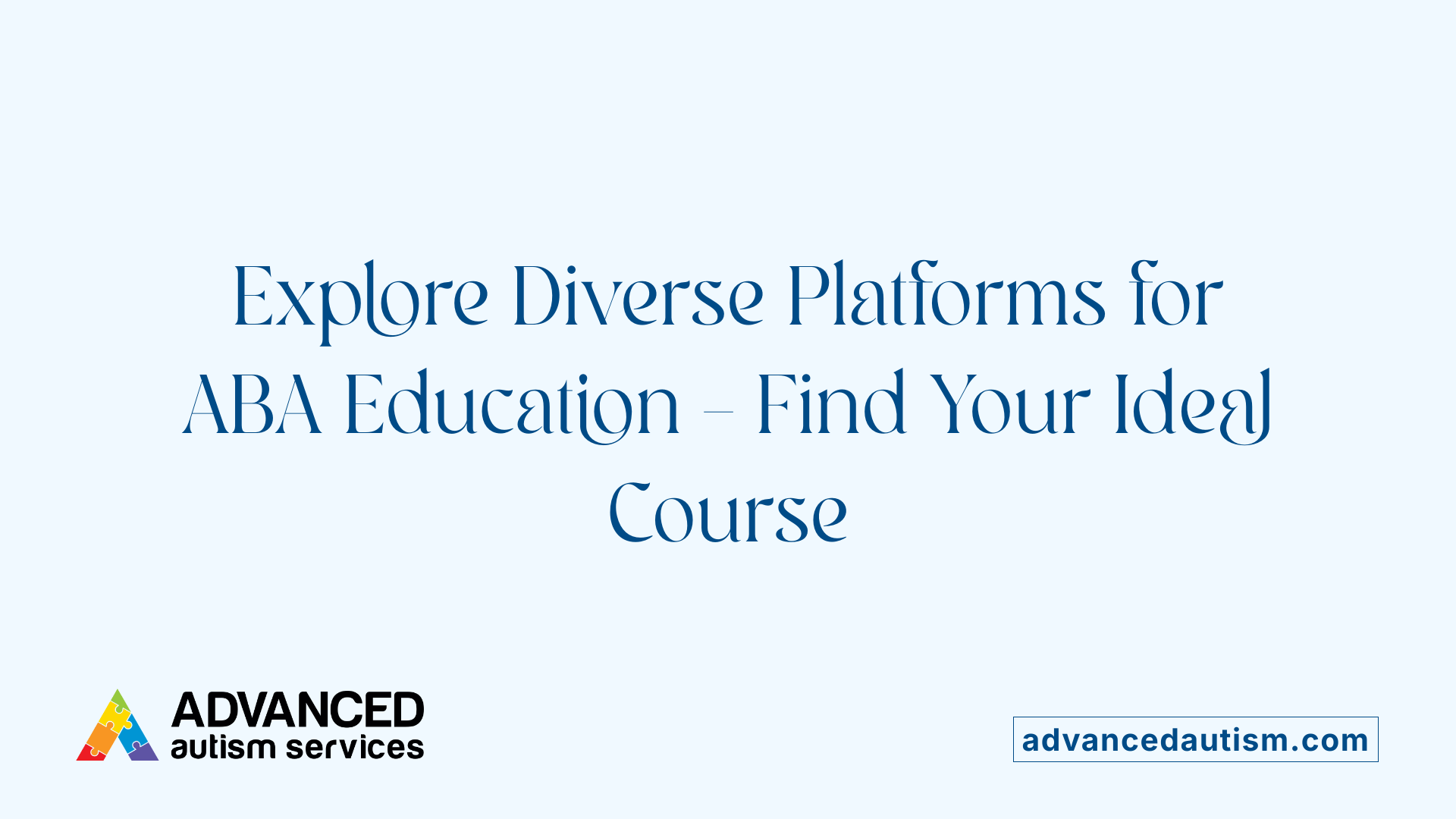The Rise of Digital Learning in Behavior Analysis
Advancements in online education have transformed the way aspiring behavior analysts and professionals access training and certification preparation. With flexible learning options, learners worldwide can now pursue comprehensive ABA therapy courses via reputable platforms, meeting certification standards and gaining practical skills for diverse professional roles.
Diverse Online ABA Course Offerings and Training Options

Can I learn ABA therapy online?
Yes, online platforms now provide comprehensive ABA therapy education, making learning accessible and flexible. Many reputable institutions and platforms offer self-paced courses, master's programs, and certification preparation, all online. These courses are designed to suit various learners, from professionals seeking certification to caregivers interested in understanding autism spectrum disorder.
For example, students can access courses that prepare them for the Registered Behavior Technician (RBT) and Assistant Behavior Analyst Technician (ABAT) credentials. These typically include modules with real-life videos demonstrating ABA techniques in natural settings, along with quizzes, interactive exams, and practical materials. Such features help prepare candidates for certification exams and real-world application.
Certification-focused programs for RBT and ABAT credentials
Many online courses meet specific requirements set by the BACB for RBT and ABAT certification. The platform offers dedicated 40-hour training programs aligned with BACB standards, ensuring that learners fulfill the mandatory training credits for certification. These courses provide detailed instruction on behavioral assessment, intervention techniques, data collection, and treatment plan creation.
In addition to initial training, these programs often include educational resources like handbooks and practical exercises to reinforce learning. They also update learners on changes in certification standards, like those implemented for 2027, keeping professionals compliant with evolving BACB requirements.
Graduate programs including M.A. and graduate certificates
Beyond basic certification training, the platform supports advanced education through online graduate programs. For instance, students can pursue a Behavior Analysis Professional Practice Master’s degree (M.A.) or a Behavior Analyst Graduate Certificate, both fully online. These programs, developed by accredited institutions and taught by experienced BCBA-verified instructors, meet the guidelines established by the Association for Behavior Analysis International.
The M.A. programs typically require 21 to 315 hours of coursework, covering topics like behavioral assessment, intervention planning, ethical practices, and behavior management. They are designed to prepare graduates for certification as BCBA, including fieldwork and supervised practicum components essential for exam eligibility.
Behavior analysis courses meeting BACB 2027 standards
Aware of upcoming standards, many courses now prepare students specifically for the 2027 certification requirements. These programs include online courses, certificates, and training modules that focus on core principles of applied behavior analysis, ensuring learners stay aligned with BACB’s evolving guidelines.
Institutions also offer live virtual information sessions, application guidance, and updated curricula to keep students informed about changes in certification processes and practice standards. This proactive approach ensures aspiring behavior analysts are well-equipped to meet future professional demands.
| Program Type | Course Content | Certification Preparation | Notes |
|---|---|---|---|
| Self-paced online courses | ABA techniques, behavior assessment, data collection | RBT, ABAT certification | Includes videos, quizzes, and practical materials |
| Graduate certificates | Advanced ABA principles, ethical practices | BCBA eligibility | Requires prior degree, aligned with BACB standards |
| M.A. in ABA | Comprehensive ABA coursework, practicum | BCBA certification | Transferable credits, suitable for professionals |
| Short online training | Introduction to ABA, treatment planning | Certification support, CE credits | Suitable for caregivers and new learners |
Whether you're aiming for certification, advanced practice, or simply increasing your understanding of autism and behavior analysis, these online programs provide accessible, reliable education tailored for diverse needs.
Course Content, Format, and Languages
What are some features of online ABA courses?
Online Applied Behavior Analysis (ABA) courses stand out for their engaging and flexible learning options. Many of these courses incorporate real-life videos that demonstrate ABA techniques in natural settings, allowing learners to see practical applications firsthand.
Interactive elements are a staple, including quizzes, exams, and practical activities that reinforce learning. These features help prepare students for certification tests and real-world practice.
Courses often offer homework assignments, projects like creating treatment plans, and sometimes even mock-binders to simulate professional environments. The goal is to equip learners with both theoretical knowledge and practical skills.
How are course formats structured?
Courses are designed with both asynchronous and synchronous formats to meet diverse learner needs. Asynchronous courses provide flexibility, letting students access materials, videos, and assessments anytime and progress at their own pace.
Synchronous sessions, on the other hand, facilitate live interaction with instructors and peers, enhancing the learning experience through real-time discussions and feedback.
Many programs combine these approaches, offering a comprehensive educational experience that balances flexibility with engagement. This setup is ideal for working professionals and caregivers seeking accessible, high-quality ABA training.
In which languages are courses available?
Recognizing the importance of accessibility, these ABA courses are offered in multiple languages, including English, Spanish, Arabic, and Dutch. This multilingual availability helps reach a broader audience and supports learners from different linguistic backgrounds.
Courses are created by reputable institutions and experts, ensuring that language diversity does not compromise the quality of education. Whether for certification, professional development, or understanding autism, learners can find courses in their preferred language.
What additional resources are provided?
Beyond core coursework, many platforms supply supplementary materials such as a Parent Training Handbook. These resources empower caregivers and professionals to implement ABA strategies more effectively and foster positive behavior changes.
Overall, online ABA courses combine comprehensive content, flexible formats, multilingual options, and useful supplementary resources, making them a valuable learning avenue for advancing skills in behavior analysis.
Certification Standards and Program Details

What are the certification standards for ABA?
The field of Applied Behavior Analysis (ABA) maintains specific certification standards that professionals must meet to certify as Registered Behavior Technicians (RBT) and Behavior Analysts (BCBA). These standards include completing designated coursework—such as the 40-hour training required for RBT certification and the 315-hour comprehensive curriculum for BCBA certification. These training programs are carefully aligned with the standards set by the Behavior Analyst Certification Board (BACB), incorporating updates set for 2027 to ensure relevance and compliance.
In addition to coursework, individuals seeking BCBA certification must acquire supervised practical experience, pass a rigorous certification exam, and commit to ongoing ethical practices. Many program providers meet these benchmarks by offering courses with practical components, supervision opportunities, and comprehensive assessments that prepare learners for professional certification.
Accredited educational institutions and online platforms ensure their courses are aligned with national and international certification criteria, often including live online information sessions, detailed application guidance, and updated content that reflects the latest BACB standards.
Do course providers meet national and international certification criteria?
Yes, most reputable course providers develop their curricula based on guidelines issued by the BACB. These providers include universities, specialized online platforms, and certification academies that deliver coursework, practical training, and exam preparation tailored to ABA certification requirements. For instance, institutions like PCOM and Arizona State University offer online ABA programs built to meet or exceed the 2027 standards, ensuring graduates are fully prepared for certification and practice.
How do tuition, certification costs, and financial planning come into play?
The costs associated with ABA certification vary depending on the program chosen. Tuition for online ABA courses can range from free options, such as Alison's autism courses, to several thousand dollars for comprehensive graduate certificate or master's programs. Certification costs include exam fees, application fees, and supervision expenses.
Prospective learners should explore financial aid opportunities, scholarships, or employer-sponsored training programs to offset costs. Many programs also provide transparent fee structures, allowing students to plan financially for their certification journey.
Overall, understanding the expense involved and planning accordingly are vital steps for aspiring ABA professionals who seek certification and career advancement.
Educational Resources and Program Curricula
What do ABA training programs typically include?
ABA training programs generally cover essential topics such as behavioral assessment, intervention techniques, ethical considerations, and effective communication skills. These core areas form the foundation of competent practice in applied behavior analysis.
In addition to foundational coursework, many programs provide supplementary materials like a Parent Training Handbook and practical guides. These resources assist learners in applying ABA principles in real-world settings, enhance understanding, and support collaboration with families.
Courses are frequently delivered by instructors who are Board Certified Behavior Analysts (BCBAs) or have equivalent practical experience. Their expertise ensures the curriculum remains relevant and grounded in current best practices.
Furthermore, online ABA programs often offer opportunities for credit transfer. Credits earned can be applied toward other degree programs, such as master's degrees in applied behavior analysis, allowing students to customize their educational and career pathways.
This comprehensive approach ensures that learners gain theoretical knowledge, practical skills, and professional credibility needed to excel in the field of ABA.
Access, Enrollment, and Learning Platforms

How do I enroll in online ABA courses?
Enrolling in online Applied Behavior Analysis (ABA) courses involves a straightforward application process, typically hosted on the educational platform's website. Prospective students often need to submit their academic credentials, such as a bachelor’s or master’s degree depending on the program. Payment of fees and meeting specific prerequisites are also generally required, especially for certification-focused offerings.
Many platforms that offer graduate certificates or Master's degrees provide detailed admission guidelines, including application deadlines and requirements. These programs frequently hold live online information sessions, which are valuable opportunities to learn about course structure, certification requirements, and career pathways.
Students are supported throughout their enrollment with access to dedicated support services, including academic advising and technical help. Learning management systems (LMS) used for these courses are designed to be accessible and flexible, supporting both asynchronous learning—where students engage with materials at their own pace—and synchronous sessions, such as live webinars or instructor-led discussions.
Whether you are interested in a comprehensive ABA certification, a graduate degree, or specialized training courses, the enrollment process is tailored to accommodate diverse student needs. This approach ensures that learners worldwide can access high-quality ABA education conveniently and efficiently.
Differentiating Resources and Learning Platforms
 There are numerous online platforms offering education and training in Applied Behavior Analysis (ABA), each catering to different learning needs and professional goals.
There are numerous online platforms offering education and training in Applied Behavior Analysis (ABA), each catering to different learning needs and professional goals.
Alison, for example, provides free courses focused on autism awareness, diagnostic processes, and supportive approaches, making it accessible for learners interested in understanding autism spectrum disorder (ASD). These courses are designed for professionals, caregivers, and anyone eager to expand their knowledge about autism, covering topics like autism in early childhood and expressive arts therapy.
Udemy offers a variety of ABA-focused courses aimed at diverse audiences such as parents, teachers, psychologists, and students. These courses typically include foundational training on ABA treatment, techniques, and strategies tailored for specific populations, like children with ADHD or ASD. The platform's courses often feature quizzes, practice tests, and lifetime access to learning materials, with instructor ratings above 4.1 for quality assurance.
University programs provide more comprehensive and accredited online coursework. For instance, Pennsylvania College of Osteopathic Medicine (PCOM) offers a 21-credit ABA certificate that meets the standards established by the Association for Behavior Analysis International (ABAI). This program prepares students to sit for the BCBA exam and includes courses in behavioral assessment, intervention, and ethical practices, taught by experienced board-certified behavior analysts.
Similarly, Arizona State University offers an online Master of Arts in Special Education with a concentration in ABA. This program covers core principles, assessment techniques, and intervention strategies, with curriculum verified by ABAI. It ensures students are well-prepared for careers in ABA therapy and related fields, aligning with professional standards and certification requirements.
In addition to formal degree programs, platforms like the website discussed here also offer specific training courses, such as a 10-part online ABA therapy course. These courses provide practical skills, including data collection, visual supports, and treatment plan creation, suitable for those seeking certification or additional competence.
Overall, these diverse educational resources—ranging from free foundational courses to accredited degree programs—support a wide array of learning objectives in ABA. They utilize multimedia content, expert instructors, and practical tools to help learners at all levels improve their skills and meet certification standards.
| Platform | Course Type | Content Highlights | Certification / Credit | Target Audience |
|---|---|---|---|---|
| Alison | Free autism courses | Autism understanding, diagnostic processes, supportive approaches | None | Caregivers, educators, general learners |
| Udemy | Professional ABA courses | Foundations, treatment techniques, strategies for ASD | Varies by course | Parents, teachers, psychologists, students |
| PCOM | Online ABA Certificate | Behavioral assessment, intervention, ethics | BCBA eligibility | Working professionals in ABA fields |
| Arizona State U | Online MA in Special Education (ABA option) | ABA principles, assessment, intervention, ethics | Qualifies for BCBA exam | Aspiring ABA practitioners, educators |
When choosing a learning platform, consider your career goals, certification requirements, and preferred learning style. Each resource offers unique advantages to support your advancement in ABA therapy and related fields.
The Broader Context of ABA Education
Why is online ABA education important?
Online ABA (Applied Behavior Analysis) courses play a crucial role in expanding access to quality training worldwide. By removing geographical and logistical barriers, these programs enable professionals, caregivers, and learners from diverse backgrounds to acquire essential knowledge and develop skills in behavior analysis.
These courses are designed to prepare learners for a variety of roles, including therapists, consultants, researchers, and educators. Many platforms offer specialized training aligned with certification requirements, such as the RBT (Registered Behavior Technician) and BCBA (Board Certified Behavior Analyst) qualifications.
Certification is a vital aspect of ABA careers, boosting credibility and opening up advanced professional opportunities. Online education providers emphasize adherence to recognized standards, ensuring that learners receive relevant, high-quality training.
In addition, these courses often include interactive components such as videos, quizzes, and practical materials, which help reinforce understanding and practical application. Overall, online ABA education supports the growing demand for trained professionals across the globe, ensuring that quality behavior analysis services are accessible to more individuals, especially in underserved areas.
Advancing Your Career in ABA Through Online Education
The proliferation of reputable online ABA courses and training programs exemplifies the field's commitment to accessible, high-quality education. Whether pursuing certification, advancing skills, or exploring new career opportunities, online learning provides a flexible, comprehensive, and credible pathway. By choosing accredited programs aligned with professional standards, learners can confidently develop their expertise in ABA therapy and contribute meaningfully to the lives of individuals with behavioral challenges.



